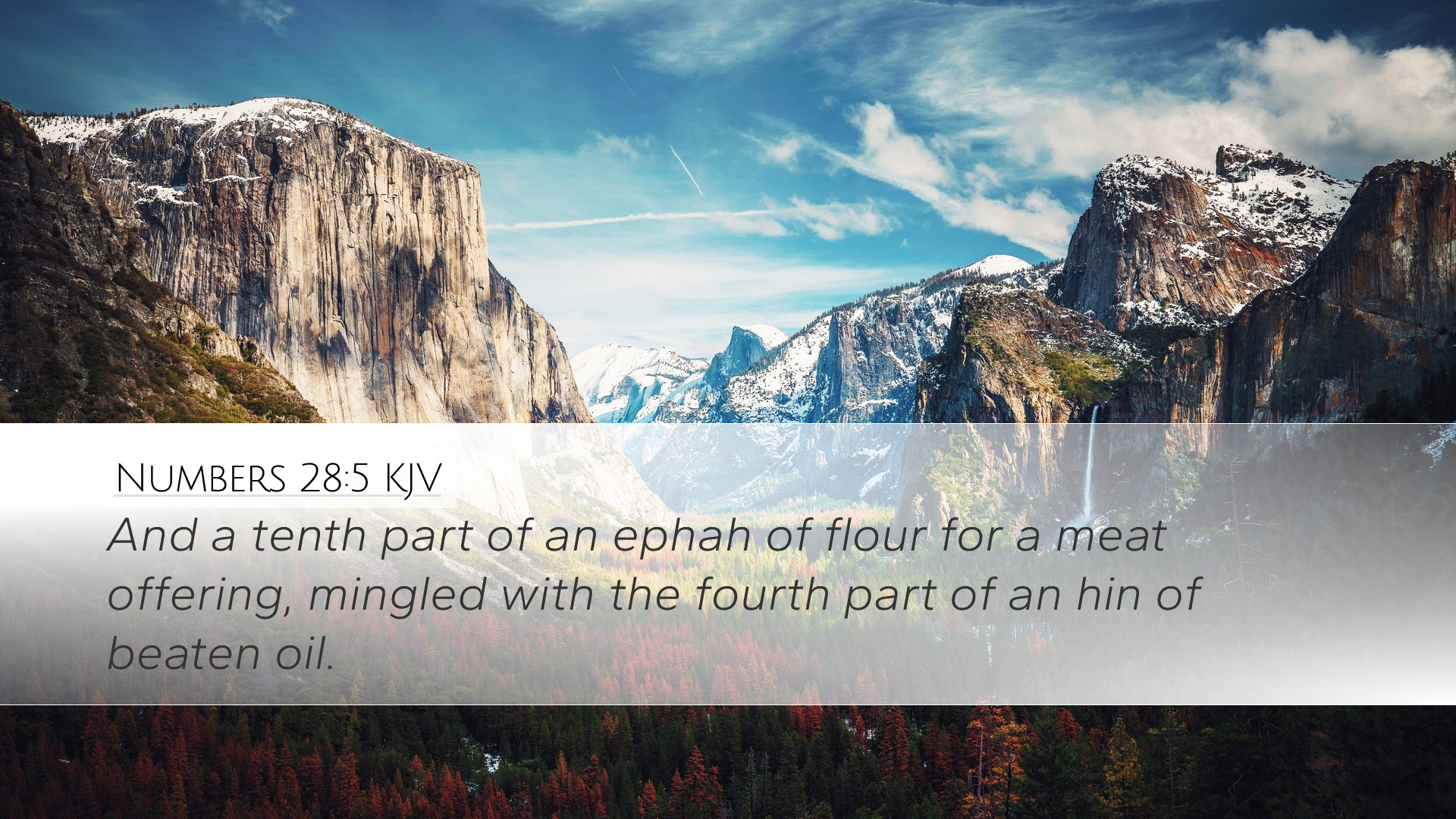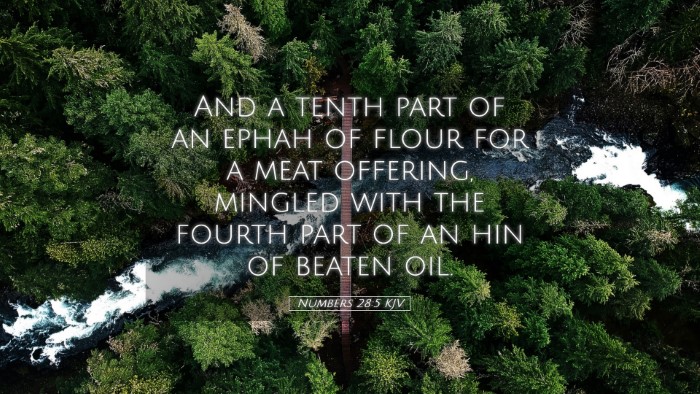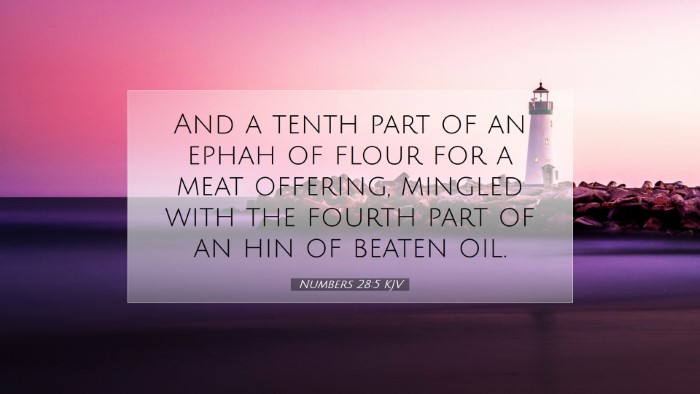Commentary on Numbers 28:5
Numbers 28:5 states: "And a tenth part of an ephah of flour for a meat offering, mingled with the fourth part of a hin of beaten oil." This verse is part of the detailed regulations concerning the offerings that the Israelites were to present to God, particularly the daily offerings for the tabernacle.
Context and Significance
This chapter in Numbers is critical as it delineates the sacrificial system established under Mosaic Law. Here, God provides Moses with specific instructions for the daily, weekly, and monthly offerings, signaling His desire for constant worship among His people.
Insights from Commentators
Matthew Henry's Commentary
Matthew Henry emphasizes the importance of the daily offerings as a daily reminder of God's presence among His people. He notes that the "meat offering" here represents thankfulness and dedication to God, indicating that offerings are not merely ritualistic but a means of establishing a relationship with the Divine.
- Symbolism of the Offerings: Henry points out the flour symbolizes the fruits of the earth’s labor. This represents gratitude for God’s provision.
- Oil as a Symbol of the Holy Spirit: The beaten oil signifies not only physical sustenance but also spiritual empowerment through God’s Spirit. This would remind the Israelites of their dependence on God.
- Daily Worship: Henry underscores that these offerings were to be made regularly, indicating God’s desire for His people to be consistently engaged in worship and reverence, thus cultivating a lifestyle of faith.
Albert Barnes' Notes on the Bible
Albert Barnes adds to the understanding of this verse through a theological lens. He highlights the precise nature of the offerings, indicating that they reflect God’s order and structure in worship.
- Precision in Worship: Barnes notes the exact quantities required for lesser and greater offerings demonstrate God’s attention to detail. This indicates that worship must be conducted according to divine instruction and should reflect the spirit of obedience.
- Inclusivity of Offerings: He points out that every individual, regardless of their means, would be able to bring an offering, as the measures cater to varied circumstances. This shows God’s desire for factors such as wealth not to hinder worship.
- Connection to Christ: Barnes relates these sacrificial offerings to their fulfillment in Christ. He posits that while these offerings were essential under the law, they ultimately foreshadowed the supreme sacrifice of Jesus, who would be the ultimate meat offering, fulfilling the law through His obedience.
Adam Clarke's Commentary
Adam Clarke provides a detailed exposition of the ingredients and the ritual associated with the offerings specified in Numbers.
- Ephah and Hin: Clarke explains the measurement references, noting that an ephah is approximately 22 liters and a hin about 3.7 liters. This quantification serves a practical function, ensuring that all adherents understand expectations for offerings.
- Mingled Offerings: The act of mixing flour with oil symbolizes the blending of earthly and heavenly resources, showcasing a type of communion with God that is expected in worship.
- The Importance of the Meat Offering: Clarke stresses that though this “meat offering” may seem minor compared to blood offerings, it carries significant weight as it portrays the fullness of life dedicated to God.
Theological Implications
This verse teaches several profound theological principles:
- God's Holiness and Worthiness: It reinforces the idea that God is deserving of our best offerings, suggesting that worship should be rooted in reverence and integrity.
- Regular Worship Practices: Regular sacrifices signify the need for a continual relationship with God, which informs contemporary worship practices where communities gather for regular remembrance of God’s goodness.
- Foreshadowing of Christ: Understanding the sacrificial system as part of God's larger redemptive narrative in Christ helps believers see the continuity of scripture from the Old Testament to the New Testament.
Practical Applications for Today
- Dedication to God: Like the offerings, believers today are called to dedicate their time, talents, and resources to God as an act of gratitude.
- Intentional Worship: Engaging in intentional and structured worship can result in a deeper relationship with God, paralleling the meticulous nature of these ancient offerings.
- Community and Inclusivity: Churches can take a cue from these laws by promoting inclusivity in worship opportunities, ensuring all believers can participate regardless of their situation.
Conclusion
Numbers 28:5, while detailing sacrificial regulations, opens a window into understanding God's character and expectations from His people. Through perspectives from notable Biblical commentators, it becomes evident that the principles of gratitude, obedience, and relationship pervade this instruction and extend into the lives of believers today. As we reflect on these insights, let's aim to embody a spirit of thankfulness and dedication akin to the ancient practices outlined in God’s holy word.


